Essayer OR - Gratuit
Fix the E.U.'s weakest link
Time
|January 24, 2024
INSIDE ROBERTA METSOLA'S PLANS TO SHAKE UP EUROPE'S PARLIAMENT

ROBERTA METSOLA HAS PLENTY OF SUPERLATIVES TO HER name. She is the youngest ever President of the European Parliament; the first from Malta, the bloc's smallest country; and the first woman in two decades. But there's one thing that landed her in the history books that she never expected. On Dec. 10, 2022, Metsola became the first President of the European Parliament to join a police raid against a fellow lawmaker. "It was sad," Metsola, who turns 45 in January, tells TIME from her office in Brussels. It was like "a punch in the stomach."
Earlier that day, Belgian authorities had notified Metsola that to comply with local law, she had to join police by 9 p.m. for a raid against lawmaker Marc Tarabella as part of a corruption investigation. So Metsola hopped on a three-hour flight from Malta to Brussels, then rushed some 70 miles into the Belgian countryside. With armed police at her side, she knocked at Tarabella's door with minutes to spare.
The bust happened to come during the FIFA World Cup quarterfinals. "There was France and England playing in a bar next door," Metsola recalls, "and I just remember hearing the cheers and thinking, Look at what I'm doing." The coincidence was not a happy one. A day earlier, police began carrying out raids and arrests across Brussels, where the European Parliament does most of its work, amid an investigation into whether World Cup host Qatar had bribed European Parliament officials. Bags of cash totaling some €1.5 million ($1.58 million) were seized during raids in homes and offices in Belgium, Italy, and Greece in the days that followed, in a scandal that ripped through not only the European Parliament but also the E.U. at large. Dubbed Qatargate, it was one of the biggest corruption scandals to hit the bloc in decades.
Cette histoire est tirée de l'édition January 24, 2024 de Time.
Abonnez-vous à Magzter GOLD pour accéder à des milliers d'histoires premium sélectionnées et à plus de 9 000 magazines et journaux.
Déjà abonné ? Se connecter
PLUS D'HISTOIRES DE Time

Time
A ZOMBIE MOVIE WITH BRAINS
28 Years Later revives a franchise, and a genre, that's about so much more than the walking dead
6 mins
July 07, 2025
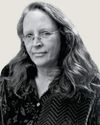
Time
Caroline Fraser The Pulitzer Prize-winning author on her new book about serial killers, the Pacific Northwest, and toxic chemicals
Your last book was a biography of Little House on the Prairie author Laura Ingalls Wilder. How do you go from that to serial killers? I was born and raised in Seattle and remember growing up with the presence of Ted Bundy. Even though I wasn’t touched by the case directly, having it happen so close was a big deal. Bundy kidnapped and killed two women on the same Sunday afternoon from Lake Sammamish— just six miles from me. It was all anybody could talk about. And then there were so many others...
2 mins
July 07, 2025

Time
Social Justice
Caroline Koziol says Instagram and TikTok ruined her life. Now she's one of hundreds of plaintiffs fighting back
13 mins
July 07, 2025

Time
Moving forward from anguishwith laughs
AT THEIR BEST, MOVIES CAN BE SUBTLE EX-pressions of feelings we’ve had but can’t fully articulate. Besides, when it comes to feelings, articulation might be overrated: one of the functions of art is to explore the undefinable, and sometimes it’s a relief to let a movie do some of the emotional heavy lifting for us.
2 mins
July 07, 2025
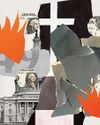
Time
When religion was forced on Americans
BEFORE THE AMERICAN REVOLU-tion, many colonies had established churches supported with tax dollars or imposed religious restrictions on voting or holding office. There was no separation of church and state. In Virginia, the most populous colony, everyone paid a tax to support the Anglican Church, which controlled marriage, poor relief, and care of orphans, and enforced laws regarding profanity and church attendance. If religious dissenters died leaving young children, Anglican officials would often place them in an Anglican home. Dissenters who failed to attend Anglican services regularly were often fined.
2 mins
July 07, 2025
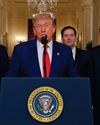
Time
U.S.Strikes Iran, Joining War
THE CONFLICT WILL AFFECT GREAT-POWER RIVALRIES, GLOBAL ENERGY MARKETS, AND THE SPREAD OF NUCLEAR WEAPONS
13 mins
July 07, 2025

Time
AI helped a couple get pregnant after 19 years
DOCTORS AT COLUMBIA UNIVERSITY FERTILITY CENTER have reported the first pregnancy using a new AI system, in a couple who had tried to conceive for nearly two decades.
2 mins
July 07, 2025
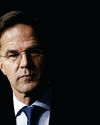
Time
Arms And the Man
FOR NATO CHIEF MARK RUTTE, GETTING EUROPE TO PAY MORE FOR ITS DEFENSE MAY BE THE EASY PART
11 mins
July 07, 2025

Time
The American Dream, glimpsed through skeptical British eyes
IN THE THIRD SEASON OF HBO’S THE GILDED AGE, A FROTHY costume drama set amid the robber barons and socialites of 1880s New York City, a servant suddenly comes into money. So much of it, in fact, that he’ll never have to work again. But instead of seizing his newfound freedom, the man keeps his windfall a secret and continues toiling below stairs. He simply can’t imagine leaving a household staff that has become his surrogate family.
3 mins
July 07, 2025
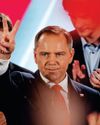
Time
The Risk Report
THE PRESIDENTIAL ELECTION IN Poland delivered the latest anti-incumbent surprise in what has been a tough period for establishment candidates the world over. The right-wing populist Karol Nawrocki, a historian with no political experience, won a narrow victory in a June 1 runoff vote over a candidate aligned with the centrist Prime Minister Donald Tusk and his plans for closer European integration. Nawrocki will take office on Aug. 6. Tusk must now buckle up for a bumpy ride.
2 mins
July 07, 2025
